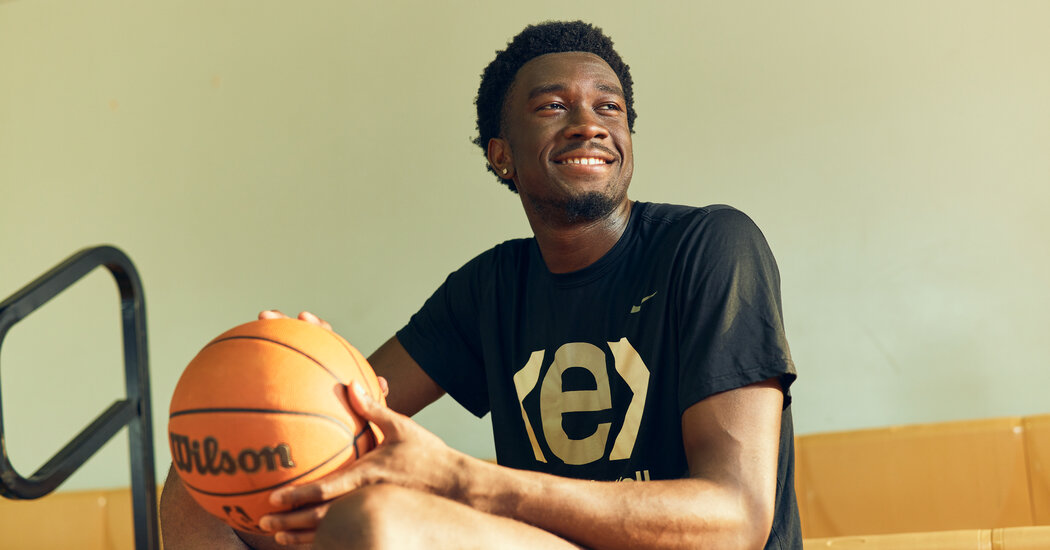
MIAMI — The training drill is named after LeBron James. Most people would be better off if they just let him do it.
Dribble a basketball while sprinting full court. Dunk it. Rebound. No time to catch your breath. Turn around and do it again.
Ten times.
Is that how to spend a morning in Miami?
Mark Williams walked into a gym tucked beside the bustling Interstate 95 in the Overtown neighborhood of Miami on a recent Thursday. The glowing lights of the gym were a poor substitute for the sunny skies in South Beach, where he could have been instead. But when you’re trying to make it to the N.B.A., some things have to wait.
He sat on the first row of bleachers inside the gym and exchanged his slides for splashy Nikes — a little blue, a burst of purple, a lot of neon orange. He wrangled the shoelaces and made his way to a video room, slipping his 7-foot-2 frame through the doorway. Williams, 20, is tall enough to touch a basketball rim just by shifting onto his toes.
He joined a handful of N.B.A. hopefuls to watch video of a pre-draft workout by the Miami Heat star Bam Adebayo from several years ago. The message? While Adebayo, now an All-Star and all-defensive team member, did not sink every one of his shots, his energy never wavered.
Williams got the message.
Baseline, sprint, dunk. Baseline, sprint, dunk. His black T-shirt and black shorts didn’t show it, but his face couldn’t hide the sweat. The LeBron James drill seemed to exhaust him. But Williams had enough in his tank to display some of the jaw-dropping athleticism that has him pegged as a potential first-round draft pick. Standing at the baseline, he jumped, rotated the ball under his legs and slammed it into the hoop.
N.B.A. prospects a generation ago were largely on their own after either declaring for the draft or exhausting their college eligibility. Their agents scheduled workouts with teams before the draft, and the players, often by themselves, flew out for the visit. They did not think of altering their diet or agonize about how to answer questions from N.B.A. personnel. They often trained for the auditions of their life by joining whatever pickup games they could find.
But the best players in Williams’s generation have little downtime while dangling on the cliff between childhood and adulthood, amateurism and the N.B.A. Their Thursdays are spent training. Their Mondays and Fridays, too, are at the gym. The hopefuls who sign with the same agent — in Williams’s case, Jeff Schwartz at Excel Sports Management — can become a team of their own. They may live with one another, attending workouts, recovery sessions and media training all aimed at preparing them for those fateful auditions and the complicated life that awaits an N.B.A. star.
It can be an anxious time, a monthslong Christmas Eve.
“I think it’s just the uncertainty about where I’m going to be,” Williams said. “When I get there, got to find somewhere to live. I got to find a car. I’m going to have new teammates, so just building a relationship with them, coaches. Just not knowing what’s going to happen. I feel like I embrace the uncertainty. It’s not like I’m nervous, but I’d say that’s the biggest thing.
“You don’t know what’s going to happen.”
‘Places where people can’t see’
Williams grew up in Norfolk, Va., the youngest of three children. His mother, Margaret, was a nurse, and his father, Alex, is a gastroenterologist. Mark went to golf camp as a child. He played tennis for a summer. He dominated flag football for a while. No sport held his imagination like basketball did.
Mark was almost 10 years old and already nearing 6 feet tall when he started shadowing his older sister Elizabeth, who at 17 was a basketball star in Virginia. She trained with Nadine Domond, a former W.N.B.A. player, who is an assistant coach for Rutgers’ women’s basketball team. Domond indulged the curious younger brother by letting him box out and practice his footwork in the post.
“I’d be messing around looking, and she would teach me little tips and tricks,” Mark said.
Mark started to envision his own basketball future when he attended the McDonald’s All American Game for top high school players in Chicago in 2011. Elizabeth had been chosen for the girls’ team.
Mark surveyed the tall, young players on the boys’ team and asked one of them — the future eight-time N.B.A. All-Star Anthony Davis — to sign his basketball. He considered the path players such as Davis were taking toward the N.B.A. That’s what he wanted to do, too.
He enjoyed watching James, who was with the Big Three in Miami, and Kevin Durant, who was beginning to harness his talents as a deadly marksman in Oklahoma City. Both were dominant, multifaceted players who seemingly did everything possible on the court. But Williams had no local N.B.A. team to follow.
He could expend most of his energy being Elizabeth’s biggest fan.
Elizabeth finished high school in Virginia and began her 2011-12 freshman season at Duke, where she became the program’s first four-time all-American. Mark was a vocal fixture at her games. “He was super loud,” Elizabeth said. “It didn’t bother me. I loved it.”
Elizabeth had figured her brother would be tall. She is 6 feet 3 inches tall, and they have a couple of uncles who are around 6-foot-9. But Mark did not simply have a growth spurt — it really never stopped. “I like being tall,” Mark said. “It’s nice. You get to see over everything, places where people can’t see.”
A rising basketball star needs that kind of vision, both physically and metaphorically. Williams became a McDonald’s all-American like his sister — although the coronavirus pandemic forced the cancellation of the game — and he chose to play basketball at Duke, too. Elizabeth’s No. 1 jersey was retired at Cameron Indoor Stadium after the Connecticut Sun took her with the fourth overall pick in the 2015 W.N.B.A. draft. She’s in her eighth W.N.B.A. season, her first with the Washington Mystics. Mark has his sights set on that kind of professional path as well. But others don’t always see what we see.
Williams debated declaring for the N.B.A. draft after his freshman season, but returned when he was pegged as a borderline first-round selection.
“I just wanted to go back and really prove myself and make it not up for debate anymore,” Wiliams said.
He flashed dominance as a rim protector and rebounder as a sophomore and grew more confident with each game. By the time North Carolina outlasted Duke in a memorable Final Four appearance in early April, he had known for a while that he would be off to the N.B.A. “Throughout the year, I really felt like I could be a pro,” Williams said.
‘Setting a tone’
The voices of Kanye West, Drake and DJ Khaled blared through the speakers of Core Fitness Miami, but Williams was tuned in to Andy Luaces.
Luaces owns the gym on Northeast 25th Street in the Edgewater neighborhood of Miami. It’s near a juice bar and is lined with framed jerseys of some of the professional athletes Luaces has trained, including Terry Rozier and John Wall. The space has fake grass, rows of weights and no room for messing around.
“If I let people start to get away with half-ass reps, then you’re setting a tone for your gym that quality here doesn’t matter,” Luaces said.
Fueled by a bagel sandwich and a smoothie, Williams was there with four other N.B.A. prospects for an afternoon workout after the morning drills at the Overtown gym several miles south.
Williams tossed a football back and forth with Ousmane Dieng, a French prospect who last played for the New Zealand Breakers, a professional men’s team based in Auckland. Luaces gathered Williams, Dieng and three others for what he called a feel-good workout. For the next hour, the group cycled through exercises that targeted their hamstrings and glutes.
They started working out with Luaces at his gym a couple of months earlier. At the time, most still had lingering aches and pains from their seasons in college or overseas. Luaces had hoped to help them become healthy, stronger and faster to make their bid for the N.B.A.
Now, with team tryouts on the horizon, he steered the workouts toward preserving their progress.
Luaces watched closely as Williams collapsed before finishing the final repetition on a Nordic hamstring exercise. He told Williams to do it again. Williams grimaced and complied, letting out a long exhale upon finishing.
Getting ready for the N.B.A. involves plenty of weight lifting and basketball, but there is more. It’s about learning to find time for balance — Williams and the hopefuls took a trip to the beach — and deciding how to craft an image. Williams picked his draft-night suit earlier that week, debating how flashy he wanted to be and what accessories he wanted to wear. He went to an Eastern Conference finals game between the Boston Celtics and the Heat in downtown Miami the day before.
“I saw A-Rod at the game last night,” Williams told Luaces, referring to the former Yankees star Alex Rodriguez.
Some fans asked Williams for selfies at the game. His height has always made him noticeable, but he also has a quick smile. Now he stands out by name, especially after the Final Four run. Williams hopes he can stir some of the same inspiration in children that his 2011 run-in with Davis spurred in him.
His oldest sister, Victoria Oloyede, has a 2-year-old son named Tristan. “He’s a lot of fun,” Williams said. “Being an uncle is fun.”
Just before leaving the gym to spend an hour in physical therapy next door, Williams asked Luaces if he had a tape measure.
Luaces found one in a drawer. Williams held out one long arm and asked Luaces to measure his wrist. He planned to buy a new bracelet soon.
“I would go 8 ½ or 8 ¾,” Luaces said. “Are you a bracelet guy?”
“He’s about to be,” Dieng chimed in.
‘Something I never experienced’
Williams returned to the Overtown gym for another hour of shooting to close the day’s sessions. The final workout was shorter and looser, designed to develop a shooting rhythm and confidence by seeing the ball repeatedly splash home.
Andrew Moran, a skills coach who works with Williams, sees him as more than a dunker and rim protector and said that N.B.A. teams would be surprised by the fluidity and accuracy of his outside shot.
Ten years ago, a 7-foot-2 center wouldn’t need to spend months working on 3-pointers. But the demands are different now. The best big men are shooters — Nikola Jokic, Giannis Antetokounmpo, Karl-Anthony Towns — so prospects want that edge.
And in this enlightened era of load management, they also want to rest sometimes.
After dunking and sprinting and activating his glutes, Williams planned to spend the rest of the day recuperating, possibly starting on a new show. He recently finished “Ozark” on Netflix.
“It was crazy,” he said of the show’s final season.
He thinks about how he would fit on various N.B.A. teams, the combinations cycling through his mind. He is projected to be drafted in the mid-to-late first round. Williams said he didn’t care where he went.
Elizabeth will be at Barclays Center for the draft on Thursday after getting permission from the Mystics to miss a game to attend with her parents and sister.
Mark is ready. He can already see it. “I’m looking good in my suit, and then when Adam Silver calls my name, it’ll just be surreal,” Williams said, referring to the N.B.A. commissioner. “It’ll be, I don’t know. I can’t even put into words that feeling. It’ll just be something I never experienced. A life-changing moment.”
On most evenings, Williams asks himself if he had a good day before drifting to sleep. Soon, he will be living the dream.




